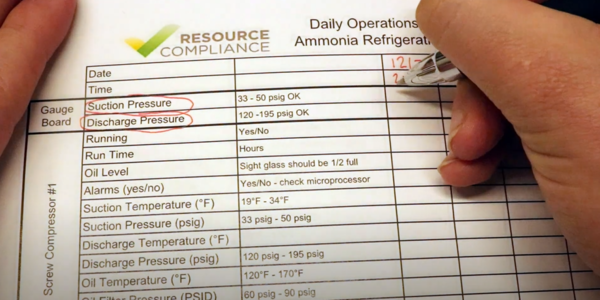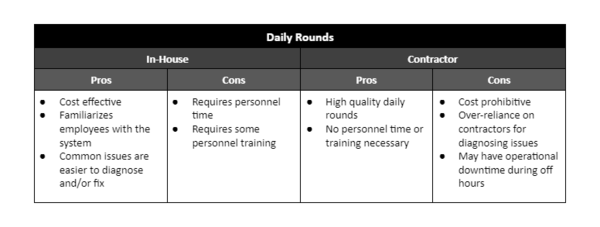Should I Hire a Contractor or Keep it In-House? | Part 3: Completing Daily Rounds In-House

Eli Macha presented a technical paper at the 2021 RETA National Conference titled IIAR 6: Should I Hire a Contractor or Keep it In-House? This blog series includes excerpts from his technical paper.
While there are always outliers, most facilities align on a couple key mechanical integrity items. What the data suggest is that there is one task which almost all facilities complete in-house and there is another task which almost all facilities outsource. This [blog] will explain the rationale behind [the first commonality].
Daily rounds are almost universally completed in-house. Twenty-three of the 28 facilities surveyed indicated the daily rounds are only completed in-house, 4 facilities indicated this task is completed in-house and by contractors, and 1 facility indicated they are not completing daily rounds. No facilities indicated that daily rounds are only being completed by contractors.
The rationale for this commonality is apparent. Paying for a contractor to visit a facility every day for routine monitoring is expensive and typically unnecessary. While this practice is not unheard of, the high cost of paying a contractor to complete daily rounds means it is not a common practice. In the few circumstances where contractors are being used for daily rounds, it is typically a temporary solution until an in-house operator can be hired or trained.
Besides the monetary incentive to complete daily rounds in-house, there is an equally compelling reason to have an employee responsible for this activity. Most people in the industry would agree that adequately completing daily rounds is only the first skill necessary for understanding an industrial refrigeration system. A facility who relies on contractors to complete the daily rounds is likely reliant on contractors far more than is necessary. Fifty-four percent of those surveyed indicated their facilities are open for more than 12 hours per day. If a facility has no employees trained to diagnose basic problems with their system, they will need to rely on their contractor during non-business hours. Not only will these visits incur overtime wages in some states, but response times during off hours are likely slower than during the day. This delay in response may also hinder production if cooling capacity is not quickly returned.
Finally, 86% of those surveyed indicated they had at least one employee whose primary responsibility was oversight of the ammonia refrigeration system. For a reasonably-sized system, one employee, whose primary responsibility is the refrigeration system, should be able to fit the daily rounds into their daily routine.
Consider the following pros and cons list. As facilities make the best decision for their business, it may benefit them to use this list as a starting point and adjust according to their situation.

The previous blogs in this series are available in the following links:
- Part 1: Introduction
- Part 2: Research Methodology

Leave a Reply